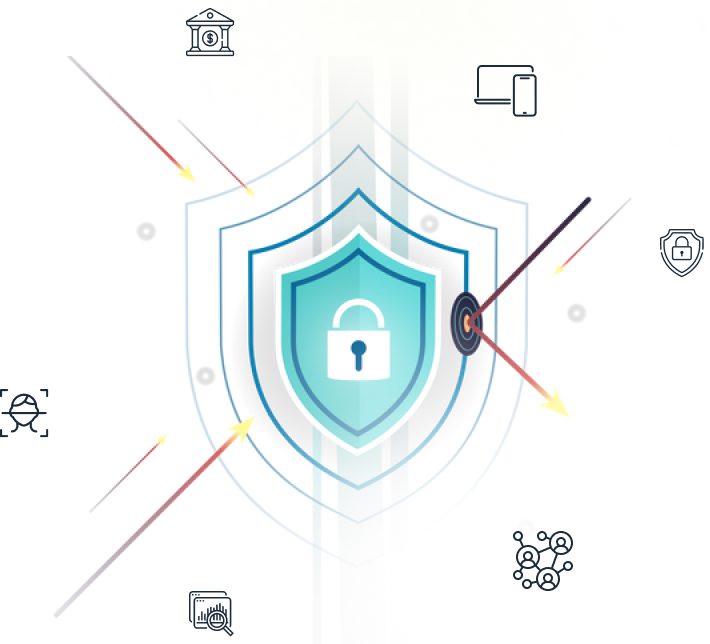
Cybersecurity: Managing The Risks of Digitalisation
Facilitator: Christian Junior, Financial Times Top 100 BAME Leaders in UK Tech
In an era defined by rapid digital evolution, Businesses are at the forefront of embracing transformative technologies. As a key stakeholder in this dynamic landscape, your leadership isn’t just about navigating today’s challenges—it’s about anticipating the digital waves of tomorrow.
When
Where
About the Programme
The need to educate your workforce on
Digital Risk Management & Cybersecurity Essentials
INTRODUCTION
In today’s interconnected world, the internet has revolutionized communication and commerce.
However, the pervasive presence of digital platforms has also given rise to various challenges, as malicious actors exploit online spaces. With over 5 billion people now connected online daily, businesses heavily rely on technology, making data security and risk management paramount.
As technology becomes increasingly embedded in our daily lives, from basic business operations to customer interactions, it’s crucial to understand and address the risks associated with digital platforms.
This programme aims to provide senior executives, C-Suite members, and decision-makers with insights into digital risks and effective strategies for managing them.
WHO SHOULD ATTEND
- C-Suite Executives, Board of Directors, Senior Managers
- Entrepreneurs and Business Leaders
- Individuals interested in risk management strategies


INTRODUCTION
In today’s interconnected world, the internet has revolutionized communication and commerce.
However, the pervasive presence of digital platforms has also given rise to various challenges, as malicious actors exploit online spaces. With over 5 billion people now connected online daily, businesses heavily rely on technology, making data security and risk management paramount.
As technology becomes increasingly embedded in our daily lives, from basic business operations to customer interactions, it’s crucial to understand and address the risks associated with digital platforms.
This programme aims to provide senior executives, C-Suite members, and decision-makers with insights into digital risks and effective strategies for managing them.
WHO SHOULD ATTEND
- C-Suite Executives, Board of Directors, Senior Managers
- Entrepreneurs and Business Leaders
- Individuals interested in risk management strategies

PROGRAMME OBJECTIVES
This executive masterclass equips participants with comprehensive understanding of the risks inherent in digital platforms. It empowers attendees to make informed decisions and implement strategies to safeguard their organisations, data, and assets from cyber threats.
Attendees will receive invaluable insights from industry-leading professionals through lectures, workshops, hands-on sessions, and real-world case studies. By the end of the course, participants will have gained essential knowledge in four key areas:
- Understanding Emerging Cybersecurity Threats
- Exploration of digital threats affecting businesses
- Implications of cyberattacks on organizations, employees, and customers
- Why staying informed about cybersecurity matters
- Understanding the ripple effects on reputation, operations, and customer trust
- Creating a Robust Risk Management Regime
- Policy Documentation and Risk Assessment

PROGRAMME OBJECTIVES
This executive masterclass equips participants with comprehensive understanding of the risks inherent in digital platforms. It empowers attendees to make informed decisions and implement strategies to safeguard their organisations, data, and assets from cyber threats.
Attendees will receive invaluable insights from industry-leading professionals through lectures, workshops, hands-on sessions, and real-world case studies. By the end of the course, participants will have gained essential knowledge in four key areas:
- Understanding Emerging Cybersecurity Threats
- Exploration of digital threats affecting businesses
- Implications of cyberattacks on organizations, employees, and customers
- Why staying informed about cybersecurity matters
- Understanding the ripple effects on reputation, operations, and customer trust
- Creating a Robust Risk Management Regime
- Policy Documentation and Risk Assessment
Programme Outline
Part 1
Introduction to Digital Risks and Cybersecurity Fundamentals
Module 1: Understanding the Digital Landscape
Subject 1: Evolution of Digital Communication and Commerce
- Tracing the evolution of digital communication and commerce.
- Analyzing the impact on businesses and their reliance on technology.
Subject 2: Challenges in the Digital Era
- Identifying challenges arising from the pervasive presence of digital platforms.
- Recognizing the need for proactive cybersecurity measures.
Module 2: Cybersecurity Fundamentals
Subject 1: Core Concepts of Cybersecurity
- Defining fundamental terms and concepts in cybersecurity.
- Exploring the historical context and evolution of cybersecurity.
Subject 2: Threat Landscape Analysis
- Assessing the current threat landscape.
- Understanding the motivations behind cyber-attacks.
Subject 3: The Role of Leadership in Cybersecurity
- Emphasizing leadership responsibilities in navigating digital challenges.
- Anticipating future digital threats and fostering a proactive cybersecurity culture.
Part 2
Building a Comprehensive Cybersecurity Framework
Module 3: Digital Risk Identification and Threat Mitigation
Subject 1: Identifying and Categorizing Threats
- Recognizing and categorizing the latest threats to digital platforms.
- Case studies demonstrating the dynamic nature of cyber threats.
Subject 2: Threat Actor Analysis
- Distinguishing various threat actors and their motivations.
- Real-world examples illustrating tactics and motives of malicious actors.
Subject 3: Digital Automation Best Practices
- Implementing secure digital automation practices, including onboarding, KYC, and account management.
- Integrating efficient automated processes while maintaining security.
Module 4: Developing a Cybersecurity Framework
Subject 1: Risk Management Regime
Building a comprehensive risk management framework.
Formulating effective policies and procedures for mitigating cybersecurity risks.
Subject 2: Fundamentals of Risk Assessment
- Exploring qualitative and quantitative methods of risk assessment.
- Understanding the role of risk assessment in proactive cybersecurity.
Subject 3: Choosing and Implementing Risk Management Frameworks
- Evaluating and selecting appropriate risk management frameworks.
- Practical steps and considerations for implementing chosen frameworks.
Module 5: Policy Documentation and Risk Assessment
Subject 1: Developing Cybersecurity Policies
- Creating comprehensive policy documents for cybersecurity.
- Implementing policies for data protection and privacy.
Subject 2: Risk Assessment Methods
- Qualitative and quantitative approaches to risk assessment.
- Case studies demonstrating effective risk assessment.
Part 3
Advanced Topics in Digital Risk Management
Module 5: Human Capital Development in Cybersecurity
Subject 1: Addressing Business Email Compromise (BEC)
- Recognizing the threat of BEC and its variations.
- Strategies for preventing and responding to BEC incidents.
Subject 2: Organization-wide Training Policies
- Developing and implementing effective training policies for the entire organization.
- Case studies illustrating successful training programs and their impact.
Module 6: Regulatory Compliance and Emerging Technologies
Subject 1: Compliance-ready Policies and Procedures
- Aligning cybersecurity policies with regulatory requirements.
- Creating documentation compliant with cybersecurity regulations.
Subject 2: Cybersecurity in the Era of Emerging Technologies
- Understanding the role of Chief Information Security Officer (CISO).
- Addressing the impact of artificial intelligence, privacy, and ethics on cybersecurity.
Subject 3: Facial Recognition and Networked Surveillance Technologies
- Examining the purposes and impact of facial recognition technologies.
- Analyzing the ethical implications of global networked surveillance technologies.
Module 7: AI, Privacy & Ethics in Cybersecurity
Subject 1: Privacy, Ethics, and AI
- Examining the intersection of privacy, ethics, and AI in cybersecurity.
- Addressing ethical considerations in the use of AI.
Module 8: Practical Application and Integration
Subject 1: Applying Knowledge to Real-world Scenarios
Participants engage in a final project applying learned concepts to practical cybersecurity challenges.
Group discussions and feedback sessions.
Module 9: Governance, Risk, & Compliance (GRC) Integration
Subject 1: Integrating Risk Management into Governance
- Understanding the seamless integration of risk management into organizational governance.
- Leading the conversation on governance, risk, and compliance.
Reviews from Participants
Having traversed the intricate maze of digital risk, numerous business leaders have emerged empowered and enlightened from our Digital Risk Management Programme. Their transformative experiences and overwhelmingly positive feedback are a testament to the program’s unmatched value.
The Digital Business Strategies training was very interactive. I will change my practice by implementing what I have learnt.
read more
The greatest takeaway for myself and my team is that we’re able to improve our inbound marketing and sale. Also, how to attract customers, convert them and close them.
I loved the practical application of course content and quality of information shared. I have learnt how to implement social media campaigns, establish brand presence and create email marketing campaigns.
One of the things I’ve learned so far from this training is that there are so many platforms that you could advertise your business or organization to earn more support or clients. We’ve learned a lot so far.
Very detailed presentation, informative and precise.
Coming out of this training, I have a better understanding of the most cost-effective tools that I can use to market my business.
The mere fact that I am a repeat customer is proof of how impressed I am with your delivery and my belief that the material that is being taught at your courses adds value to position my business in a lead position for profitability and to achieve its vision. I learnt new concepts and feel more…
read more
The training is insightful and professionally delivered; it reveals the realities of customer behaviour in digital age
One of the things that stood out to me is the fact that in order for your business to be relevant in this technological age, you can use the different social media platforms to promote your business. It can help you to get more customers.
I’ve been to the business transformation course in Guyana. It was awesome and I encourage all of you to try and get digitally transformed.
I would like to commend you for the quality and volume of material you put together for the 2-day Digital Transformation Strategies course. I found every topic as a unique opportunity to expand my knowledge and most importantly grow as a professional. As the Digital Marketing Personnel for my organisation, the strategies you taught has…
Testimonial:This seminar was timely and relevant for me because I’ve spent more time communicating online on a personal and business level. I found the facilitator to be knowledgeable in the subject matter and he was able to communicate the info in a simple and jovial manner. My awareness has risen toward possible online and physical…
I am Carlon Gabriel from the Communal Co-operative Credit Credit Union. I am very happy I took this course. The coopetition idea is great and the platform business model. I do believe we should keep in contact. Thanks
I just want to thank Christian for journeying all the way to Grenada to do this for us. I think it is a much-needed program at this point in Grenada where we are moving and transition into a time whereby everything is done online.
I found the training in digital strategies for business growth to be a real and practical journey towards my organization achieving a competitive edge in the industry; the finance e industry. It really put in focus our strategic plans; how we target our customers and remain relevant in a digital marketing world.
I must say this course has been very insightful and I would recommend it for anywhere who is serious about marketing and business growth.
The digital age is upon us. Guyana is an right now in the emerging state so internet boom will be upon us soon. Digital technologies, so to speak, should be adopted by everyone. We should transform our current ways of doing things and go digital because that is where the future is.
I’ve learned that we don’t need to fight our competition; we can cooperate to get a co-opetition.
Christian’s brain works as quickly as the internet when it comes to digital strategies and marketing ideas. He was free with his advice and guidance and whatever else he thought would help us understand and implement the knowledge into our organisations’ digital strategies. He has an interactive form of training that allows your learning to…
I just completed the Digital Strategies for Business Growth course which was moderated by Christian. This guy is fantastic; he knows his stuff. His delivery mechanisms are fantastic. He’s very conversant with the topic and I would suggest this course to everyone. My main takeaway from this course is that it has opened my mind…
Cybersecurity Case Studies
TSTT:
TSTT, a telecommunications company, faced a cyber attack on October 9, 2023, when cyber attackers attempted to gain unauthorized access to its systems. The company took immediate steps to minimize the security vulnerability, successfully isolating its systems and applications. These applications were subsequently quarantined, rebuilt, and put back into production as part of clearly defined policies and procedures. The company also enlisted the support of internationally recognized cybersecurity experts and partners in investigating the attempted breach and advising on the implementation of appropriate additional security measures and protocols. Some of these recommendations have already been implemented.
Cyber Attacks in 2022:
The Caribbean region, including Trinidad and Tobago, experienced 144 million cyberattack attempts in the first half of 2022. Ransomware was the most common type of breach2. The TT Cybersecurity Incident Response Team (TT-CSIRT) of the Ministry of National Security reported a significant increase in attacks, especially ransomware.
Capital One Data Breach:
In 2019, Capital One, one of the largest financial institutions in the US, suffered a data breach that exposed the personal information of over 100 million customers. The breach was caused by a misconfigured firewall that allowed a hacker to access the company’s cloud storage and steal sensitive data
McLaren Health Care:
a US-based healthcare giant, suffered a ransomware attack that resulted in the theft of sensitive personal and health information of 2.2 million patients. The stolen data included personally identifiable information, medical and health insurance details, and other sensitive data
WannaCry Ransomware Attack:
In 2017, the WannaCry ransomware attack affected over 200,000 computers in 150 countries. The attack exploited a vulnerability in Microsoft Windows and encrypted users’ files, demanding a ransom payment in Bitcoin to restore access
Equifax Data Breach:
In 2017, Equifax, one of the largest credit reporting agencies in the US, suffered a data breach that exposed the personal information of over 147 million customers. The breach was caused by a vulnerability in the company’s web application framework that allowed hackers to access sensitive data
Return on Investment
Here’s why our exclusive program with Christian Junior, the international cybersecurity strategist, is imperative for every modern CEO, C-Suite or Senior Management:
Improved Reputation
Good cybersecurity strategies can promote customer trust, enhance the reputation of a business and open up new commercial opportunities.
Improved Competitive Advantage
Gain competitive advantage by planning ahead for all possible scenarios to ensure your business can withstand or recover from any cyber attack. Good security can be an enabler for a thriving business: you will be protecting your assets, your reputation, your customers, and your peace of mind.
Reduced costs
The world lost $945bn to Cybercrime in 2020. Businesses can save money by adopting an efficient risk management “preventive” approach – plan, implement and review rather than a more expensive “reactive” approach in the aftermath of an attack.
Tailored to the Global Unique Landscape
While global insights are essential, understanding how they map onto our unique context is crucial. Our programme delves into both global and local cyber threats, ensuring you’re equipped to protect your enterprise on all fronts.
Comprehensive Approach
From identifying digital assets to understanding the ROI of risk management, our agenda ensures that you’re not just aware, but prepared and proactive in all areas of digital risk management.
Engage with an International Expert
Christian Junior brings a wealth of global knowledge and experience. Benefit from his insights tailored to the global context, ensuring your strategies are both globally informed and locally relevant.
Networking with Peers
Share experiences, concerns, and solutions with fellow CEOs and top-tier leaders. This event is a rare confluence of business leadership, offering invaluable networking opportunities.
Governance, Risk, & Compliance (GRC)
Seamlessly weave risk management into your governance fabric. The stakes have never been higher. Ensure that you, as a modern CEO, are not just part of the conversation but leading it.
Interactive Q&A
Address your unique concerns, gain clarity on pressing issues, and receive direct guidance from one of the world’s leading experts.
Programme Details
Dates & Times:
Wednesday 7th August 2024
9:30 am – 5:30 pm EST
(St Kitts and Nevis Time)
Programme Fees:
Standard:
$355
REGISTER YOUR CREDIT UNION
We have proudly worked with


















































